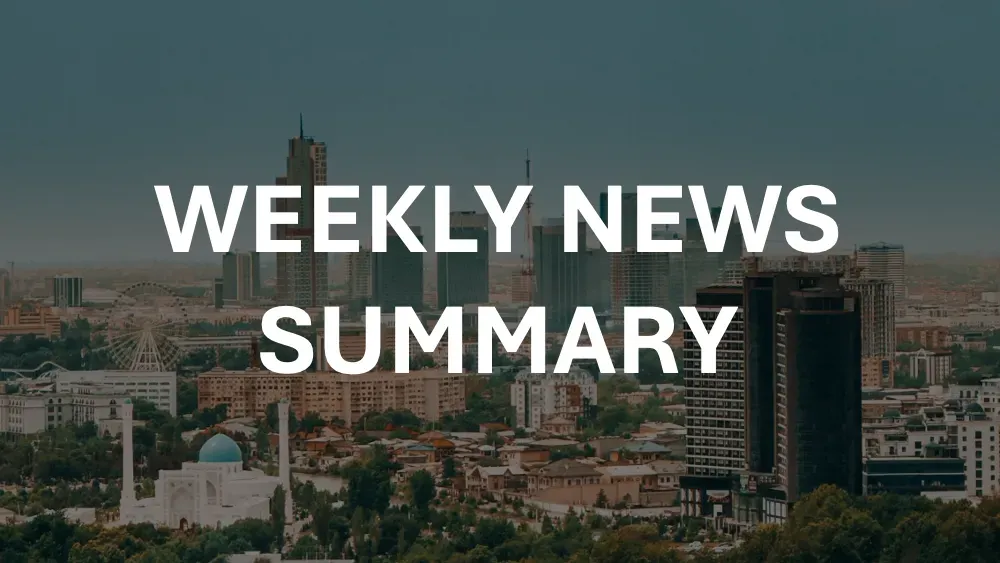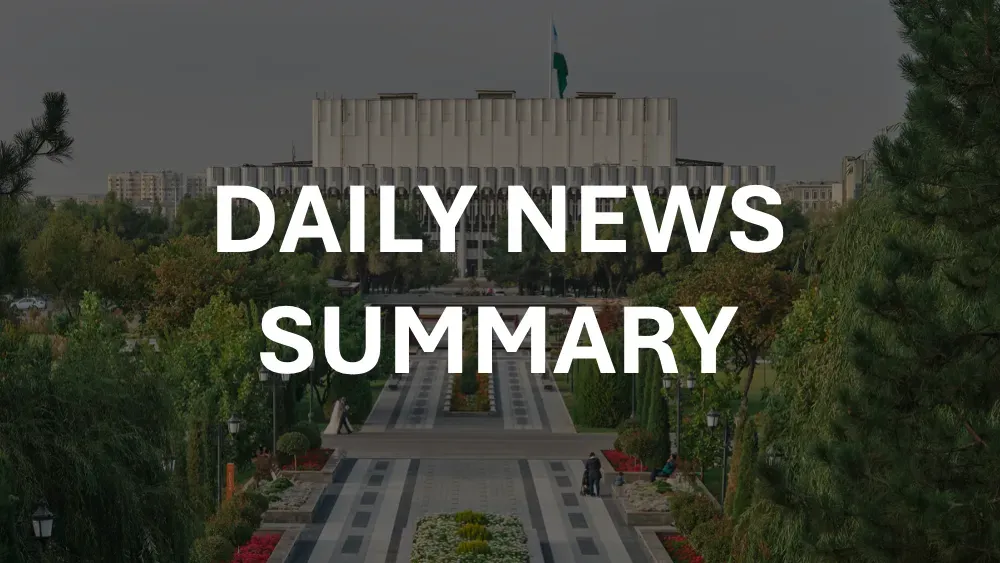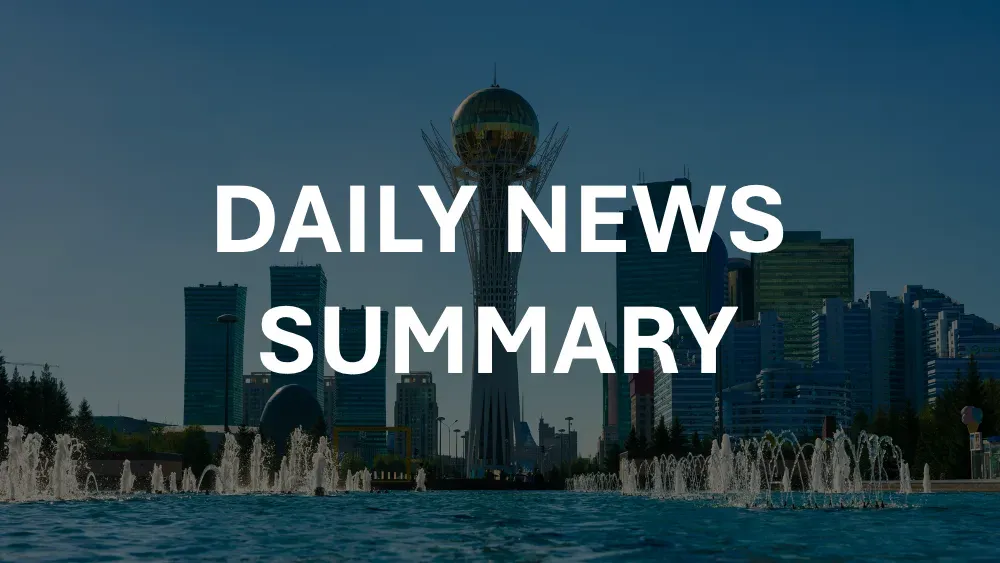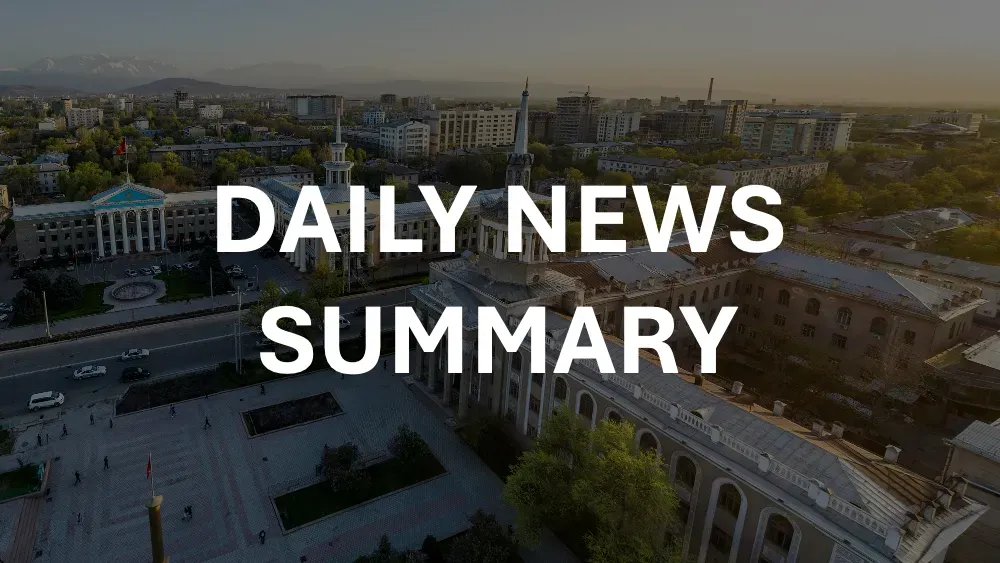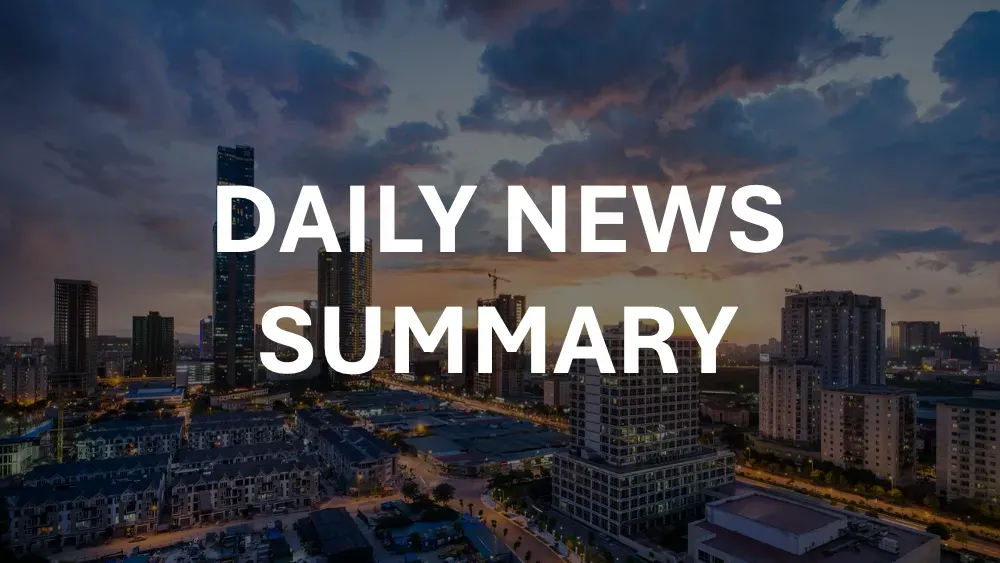This weekly digest showcases just 10 stories. Daily subscribers receive comprehensive intelligence briefs with 40 of the top stories organized by category. Don't miss the stories that matter.
Subscribe to Daily →
September 19, 2025 to September 25, 2025
This week's top 10 stories from Uzbekistan, selected from our daily intelligence briefs.
1. WTO Membership Target Set for March 2026, Director-General Notes Strong Momentum
WTO Director‑General Ngozi Okonjo‑Iweala said Uzbekistan could attain World Trade Organization membership by March 2026, noting “very determined action” and steady progress in accession talks as technical negotiations and domestic legislative alignment advance. President Shavkat Mirziyoyev and senior officials, including Presidential Administration head Saida Mirziyoyeva, have held recent high‑level meetings with Okonjo‑Iweala (New York at UNGA 80 and Geneva) to review reforms; a WTO Working Party session is planned for November to lock in final steps toward the government’s target tied to the 14th Ministerial Conference.
For businesses and investors, accession would formalize market‑access terms, reduce tariff and non‑tariff barriers over time, improve dispute‑resolution predictability and facilitate integration into global value chains. Bilateral market‑access talks are largely complete with Pakistan, Thailand, the United States, the United Kingdom, Switzerland, Argentina, Australia and Honduras; a small number of partners—likely including Russia and the EU—remain to close outstanding commitments.
Local Coverage: kun.uz, uzdaily.uz, anhor.uz, uza.uz, gazeta.uz, qalampir.uz
From daily briefs: 2025-09-19, 2025-09-24, 2025-09-25
2. NASDAQ to Support Overhaul of Tashkent Stock Exchange, Including Infrastructure for Government Bond Trading
Uzbek President Shavkat Mirziyoyev met NASDAQ Chair Adena Friedman in New York to advance a partnership to modernize the Tashkent Stock Exchange and build integrated infrastructure for government securities trading. The plan would leverage NASDAQ’s technology and market-operator expertise (it oversees more than $30 trillion in assets) to improve transparency, liquidity and post‑trade efficiency, potentially widening institutional access to Uzbek sovereign debt.
The initiative follows leadership changes at the exchange earlier in September and aligns with Uzbekistan’s push to diversify financing beyond banks. Korea Exchange is already a 25% shareholder while the state asset agency holds 75%; adding NASDAQ would introduce a second major international partner to governance and systems, signaling a move toward global market standards and attracting foreign institutional investors.
Local Coverage: gazeta.uz, uza.uz, kun.uz, uzdaily.uz
From daily brief: 2025-09-24
3. Telecom Operators Cleared for Direct International Internet Access Following Market Liberalization Decision
On September 18, 2025 the Cabinet of Ministers approved Resolution No. 592 (effective September 19, 2025), launching a pilot that permits telecom operators with mobile and/or fixed networks to connect directly to international internet gateways for their own commercial use, subject to full information and cybersecurity compliance. The measure implements Presidential Decree PF-85 (June 3, 2024) and requires participating operators to establish internet access centers, demonstrate nationwide infrastructure covering at least 50% of the population (including remote areas) via backbone fiber, and show sufficient capacity for broadband services; project documentation must be submitted to the Republican Center for Management of Uzbekistan’s Telecommunications Networks.
The decision signals a cautious step toward liberalizing Uzbekistan’s telecom market and creating a more competitive framework by enabling vertical operators to bypass intermediaries for international bandwidth procurement. For international professionals, the pilot—its technical prerequisites, regulatory oversight, and cybersecurity conditions—will be a key test of whether the state can balance market opening with control over network security and universal coverage targets.
Local Coverage: norma.uz
From daily brief: 2025-09-23
4. Berlin Partnership Expands with €152m Project Financing Agreement
Uzbekistan and Germany have deepened their strategic partnership following recent talks that emphasized active involvement by sectoral ministries and agencies across healthcare, education, urban development and climate initiatives. A key outcome was agreement to sign financing for projects worth €152 million, including grant components, alongside new initiatives targeting sustainable development, technology adoption and broader investment collaboration; the report, attributed to O‘zA correspondent M. Pirmatova, did not specify project names or timelines.
The discussions signal continued German engagement in Uzbekistan’s reform and infrastructure modernization agenda and could help unlock additional EU-linked financing and technical partnerships for public services and the green transition. Planned consultations are framed as a mechanism to consolidate the partnership and accelerate joint projects, with implications for enhanced bilateral coordination and potential scaling of climate and digital initiatives.
Local Coverage: uza.uz
From daily brief: 2025-09-22
5. EDB Membership Approved with $168.4m Paid-In Share Purchase Plan
Uzbekistan has formally joined the Eurasian Development Bank (EDB), approving purchase of 777,777 shares at $1,000 nominal value each under a phased paid-in share plan. The Investment, Industry and Trade Ministry will take 168,411 paid-in shares (21.7%) and 609,366 callable shares (78.3%), committing $168.411 million in paid-in capital; an initial $10 million is due by Sept. 23, with two equal tranches of $79.2055 million scheduled for 2026–2027. Deputy Prime Minister Jamshid Khodjayev is designated plenipotentiary and Deputy Minister Khurram Teshaboyev deputy representative, with the ministry as the authorized body for EDB relations.
The accession links Uzbekistan to the EDB — founded by Russia and Kazakhstan in 2006 and headquartered in Almaty — which has $7 billion in charter capital and focuses on integration-oriented investments across member states. Membership could broaden Uzbekistan’s access to project finance and regional investment platforms, while signaling deeper economic engagement with EDB member economies.
Local Coverage: kun.uz, qalampir.uz, gazeta.uz
From daily brief: 2025-09-19
6. Kazakhstan Halts All Fuel Exports, Extending Ban to Regional Markets Including Uzbekistan
Kazakhstan has imposed a blanket ban on petroleum product exports for June, extending a nationwide restriction first announced on 19 May (a six‑month measure) and confirmed by the Energy Ministry to cover neighboring markets including Uzbekistan. Authorities say the pause—also following a separate ban on gasoline and diesel exports outside the Eurasian Economic Union from 1 January 2025—aims to build strategic reserves and stabilize domestic supply and prices ahead of peak summer demand; reported inventories have risen sharply, with AI‑92 stocks up nearly 70% and diesel up 78% by early summer. The ministry noted an exceptional surplus shipment of AI‑92 to Uzbekistan in spring 2025 addressed storage constraints but stressed exports have been fully suspended since June pending refinery maintenance.
For Uzbekistan, which has depended on Kazakh imports to cover seasonal shortfalls, the halt risks tightening supplies and pushing up retail prices unless alternative sources or increased domestic output plug the gap. Regional logistics and traders that route volumes through Kazakhstan should expect short‑term disruptions; the development comes as Uzbekistan phases out AI‑80 from September and transitions to higher‑octane fuels from 2026, complicating short‑term matching of fuel specifications and supply.
Local Coverage: kun.uz, qalampir.uz
From daily briefs: 2025-09-24, 2025-09-25
7. State Stake in National Investment Fund Reduced to Prepare IPO of Portfolio Companies
A presidential decree dated 19 September 2025 (effective 22 September 2025) reconfigures state holdings in the National Investment Fund (NIF) ahead of an IPO of the fund’s shares on domestic and international exchanges. To streamline governance and make the NIF more attractive to investors, the decree reduces the state’s equity in the NIF by reassigning NIF-held stakes in Uzbekistan Airports, Business Development Bank and Microcreditbank to the Ministry of Economy and Finance, and transferring Uzbekistan Post to the Agency for Management of State Assets.
At the same time the state consolidates substantial holdings into the NIF: a 30% stake in Uzsanoatqurilishbank (via the Ministry), plus additional stakes of 20% in Uzbekhydroenergo, 10% in Uzbekinvest and 15% in Temiryolinfratuzilma. An interagency working group was also approved to coordinate the NIF IPO. The measures suggest a two‑track strategy—centralising commercial assets for clearer market-facing ownership while reallocating social/strategic assets away from the fund—to improve transparency and investor appeal ahead of international listing.
Local Coverage: norma.uz
From daily brief: 2025-09-26
8. National Carrier Orders up to 22 Boeing 787-9s, expanding long‑haul network and U.S. ties
Uzbekistan’s flag carrier has placed its largest-ever order with Boeing for 14 787-9 Dreamliners, with options for eight more — a commitment that could total up to 22 aircraft — as deliveries begin in 2031 (previously indicated in a 2029–2032 window). The deal, announced during President Shavkat Mirziyoyev’s meeting in New York with Boeing Global President Brendan Nelson, also included a memorandum between Boeing and Uzbekistan’s Transport Ministry to help develop the country’s aviation ecosystem.
The carrier says the fuel-efficient, long‑range 787-9s will underpin an expansion of long‑haul services to North America, Europe, the Middle East and the Asia‑Pacific and strengthen Uzbekistan Airways’ hub ambitions in Central Asia. U.S. political and economic implications were highlighted by U.S. President Donald Trump’s comment that the purchase — described as worth more than $8 billion — would support tens of thousands of U.S. jobs; Uzbekistan Airways chairman Shukhrat Khudaykulov framed the order as a move to broaden international connectivity for passengers.
Local Coverage: uzdaily.uz, gazeta.uz, qalampir.uz, anhor.uz, kun.uz
From daily brief: 2025-09-24
9. Mirziyoyev Concludes New York Trip with US Deals, UN Reform Pitch, and Expanded Strategic Ties
Uzbekistan President Shavkat Mirziyoyev concluded a high‑tempo New York visit for the UN General Assembly (80th session), combining a push for UN Security Council reform with a concerted US economic outreach that yielded a headline commercial and a slate of strategic engagements. Key meetings included U.S. President Donald Trump, UN Secretary‑General António Guterres, IMF head Kristalina Georgieva, World Bank and WTO officials, and corporate leaders from Boeing, BlackRock (Adebayo Ogunlesi), Citigroup and NASDAQ. Tashkent announced sectoral deals across aviation, critical minerals, chemicals, energy and finance—most notably Uzbekistan Airways’ purchase of 22 Boeing 787s (14 firm, 8 options) valued at about $8 billion, and a claimed project pipeline of roughly $105 billion formed around the visit versus $19.4 billion in 2018.
The outcomes signal a stronger Uzbekistan–U.S. strategic tilt and accelerated efforts to attract private and multilateral capital for infrastructure, energy transition and mining supply chains: agreements include a $1 billion Traxys mining portfolio, talks on eurobond support with BNY, and expanded World Bank cooperation (a $14+ billion portfolio and new regional office in Tashkent). Mirziyoyev used his UN address to underscore poverty reduction, regional integration and Afghan transit corridors while urging Security Council expansion—positions that, together with the commercial deals and pledges of implementation, aim to lock in financing and technical partnerships to advance Tashkent’s reform and regional hub ambitions.
Local Coverage: qalampir.uz, anhor.uz, kun.uz, uza.uz, gazeta.uz, uzdaily.uz
From daily briefs: 2025-09-23, 2025-09-24, 2025-09-25, 2025-09-26
10. Three IAEA Nuclear Safety Conventions Entered as Tashkent Advances Reactor Plans
Uzbekistan has formally acceded to three core IAEA instruments—the Convention on Early Notification of a Nuclear Accident, the Convention on Assistance in the Case of a Nuclear Accident or Radiological Emergency, and the Convention on Nuclear Safety—documents handed to the IAEA by Abduvaqqos Rafiqov, chair of Uzbekistan’s Committee for Industrial, Radiation and Nuclear Safety. The accession, announced at an IAEA ceremony where Director General Rafael Grossi highlighted presidential backing and rapid decision‑making, aligns with Tashkent’s active plans for a large nuclear power plant and prospective small modular reactors (SMRs), and commits Uzbekistan to international peer review and emergency cooperation frameworks.
The move also occurred alongside accessions from regional peers including Kyrgyzstan and Bangladesh, signaling growing uptake of IAEA safety and response standards across Asia. For international professionals, the key implications are strengthened regional interoperability on nuclear emergencies, enhanced regulatory obligations for Uzbekistan as it advances major nuclear projects, and a reduced diplomatic and technical barrier to vendor engagement and multilateral oversight as project planning progresses.
Local Coverage: anhor.uz, kun.uz, uzdaily.uz
From daily brief: 2025-09-23
About This Weekly Digest
The stories above represent the most significant developments from Uzbekistan this week, selected through our AI-powered analysis of hundreds of local news articles.
Stories are drawn from our daily intelligence briefs, which synthesize reporting from Uzbekistan's leading news sources to provide comprehensive situational awareness for international decision-makers.
These weekly highlights are a small sample of what's happening. Daily subscribers get comprehensive briefings with 40 top stories that connect the dots between events, track developing stories, and provide the context you need for informed decision-making.
Upgrade to Daily →
